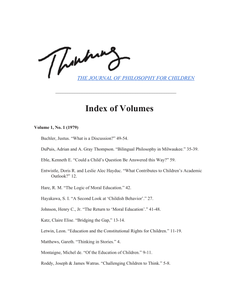The journal was a forum for the work of both theorists and practitioners of philosophical practice with children, and published such work in all forms, including philosophical argument and reflection, classroom transcripts, curricula, empirical research, and reports from the field. The journal also maintained a tradition in publishing articles in the hermeneutics of childhood, a field of intersecting disciplines including cultural studies, social history, philosophy, art, literature and psychoanalysis.
DOCUMENT

The topic of this paper is the constructivism-realism debate, construed as an example of the intrusion of philosophy into science. Against this intrusion I maintain that philosophical problems are not only different from scientific and practical ones. They are also problematic in themselves. That is why their import into our scientific and practical work only creates confusions that hinder us in our work. The aim of the paper is to show that the philosophical problems that create those confusions need a Wittgensteinian therapeutic treatment. The method of the paper consists in comparing what philosophers (or philosophising scientists) say we do with what we actually do. After giving an example of what happens when a rightly respected scientist starts philosophizing, the method is applied, first, to the relation between language and the world and, second, to the relation between theories and the world. In the first application a story about three umpires is used to distinguish language and discourse, between questions of meaning (of the words we use) and questions of truth (of the things we say). In the second application a comparison between maps and theories is used to show the difference between assessing the truth of descriptive statements and explanatory theories. The examples of the umpires and maps are introduced by Weick and in both cases I show that neither constructivist nor metaphysical realist conclusions follow.
DOCUMENT

“Municipal Youth Work taken over by Christians”. (Binnenlands Bestuur, 2009) This heading refers to the work of Youth for Christ in an Amsterdam neighbourhood. This organisation, successful in Youth Work nationwide, last year came out first in an open competition of the Amsterdam district De Baarsjes. Because of this they were commissioned to undertake all the youth work in this multicultural neighbourhood. The conditions were not to evangelise and not to limit recruitment of personnel inside their own circle but to recruit from outside the organisation as well. When they later appeared to have put a job advertisement only on their own website, this led to heated debates. Finally Youth for Christ acknowledged and rectified this mistake. This example is a concrete illustration of the actual and sometimes delicate relationships between philosophy of life and social work
DOCUMENT
